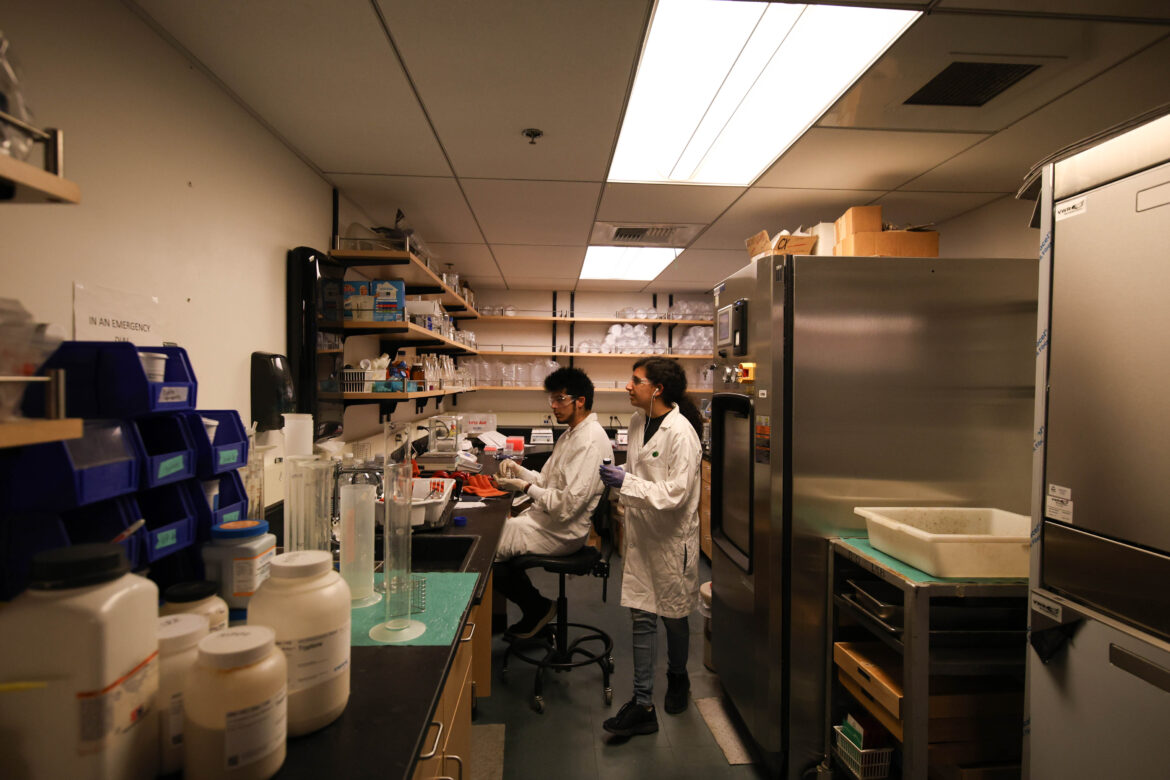Updated on June 17 to clarify that Gavin Newsom was the governor of California in 2021.
After coming to the United States in 2003 and enrolling at Pasadena City College, a young man from Indonesia didn’t yet know what career path to take. After discovering the college’s biotech program, he became aware of other careers in life science and worked his way to places he never imagined.
Now at Pierce College, Director of the ASPIRE Biotech Program Aron Kamajaya wants the same opportunities for his students.
“If you asked me before, as a community college student coming from a poor family in Indonesia, ‘What’s your American dream?’ I would just tell you, ‘If I can get a full-time job, put food on the table, send some money back home to my parents, that’s my American dream,’” Kamajaya said. “That [biotech] program took me from low-income into sort of middle-class, and then when I got into this tenure position here, I thought, ‘You know what? I’m going to build the same program that helped people like me.’”
Pierce College has been developing a low-cost baccalaureate degree in biomanufacturing. The price per unit would come out to about $130 to $134, according to Pierce Interim President Ara Aguiar, and would not be substantially higher than the $46 per unit for regular classes.
Senate Bill 850—signed in 2014 by then-Governor Jerry Brown—authorized a baccalaureate degree pilot program at 15 California community colleges, according to cccco.edu, and in 2021 Governor Gavin Newsom signed AB 927 to expand the program. Following California law, these bachelor’s programs cannot duplicate programs already available at a UC or CSU, according to EdSource.
Following an “optimistic timeline,” upper division courses for the baccalaureate program are estimated to begin in the Fall 2025 semester.
Nine units of upper division, non-biotech classes are also required for the degree, said Kamajaya. Pierce faculty are working to develop courses across their departments, such as bioethics with the philosophy department, organizational communication and data literacy with the communications department and technical writing with the English department.
In the meantime, cohorts of students have been learning, researching and working in weekend biotechnology classes.
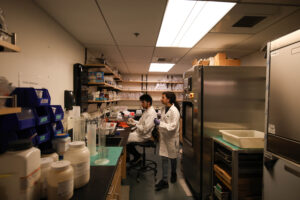
or species the insects or plants come from.“It was kind of the first time we’ve ever done anything with plants, let alone DNA barcoding,” Refua said. “I’m a really big fan of ecology—I mostly chose it because I wanted an excuse to walk around in the garden during class time. That’s been a lot of fun for me. I also got to learn a lot about plant DNA, which has been really interesting.” Photo by Raquel G. Frohlich.
Biotech 3 student Marcelo Cabrera, who is pursuing associates degrees in political science and law, public policy and society, as well as a certificate in biotechnology, sees the biotech program as a huge opportunity for students.
“Dr. K likes to talk about [how] a lot of these jobs require experience, which the lab training you get here does count as actual lab experience because they hold you up to lab protocol,” Cabrera said. “Once you get those certificates, or you get the associates, or the bachelor’s, whatever you decide to get, the pay scale just increases more and more. It’s not something you would know about unless you happen to go somewhere that specializes in it, and it’s a growing industry.”
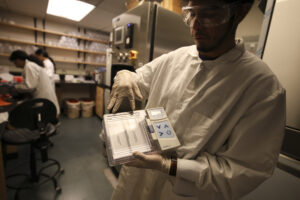
Biotechnology and biomanufacturing are like two sides of the same life science industry, explained Kamajaya.
Pierce offers an associates degree in biotechnology, which involves research and development. For the baccalaureate program, the focus will be on the manufacturing and production side.
“In manufacturing, it’s more like you have to do exactly what has been written in the protocol,” Kamajaya said. “There’s a lot of regulation from the FDA, then you learn about the business aspect of it like Six Sigma, lean manufacturing, supply chains, something you never learned if you’re purely a life science major. So our baccalaureate degree program is more focused on that production side and all the regulatory principles behind it.”
Currently, 23 states allow community colleges to offer bachelor’s degrees, according to Inside Higher Ed. In California, community colleges that offer a bachelor’s of science in biomanufacturing include Los Angeles Mission College, Moorpark College, Mira Costa College and Solano Community College.
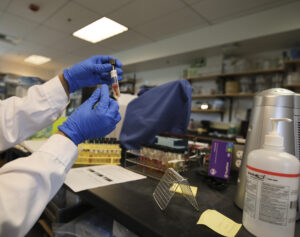
One continuous challenge may be funding. Some equipment that have been purchased for the program include bioreactors and flow cytometers.
“But you know, if we do good work, this is something my Ph.D adviser told me, ‘Good science never starves,’ which means like, if you do good science, you will always get funding,” Kamajaya said.
For the fiscal year 2021-22, Pierce was allocated $212,367 in Strong Workforce Program funding, which could be used to help develop a biotechnology training program, and the U.S. National Science Foundation (NSF) awarded $520,304 to establish a protein biomanufacturing training program on campus. This month, another $648,000 was granted by the NSF through the Illumina Genomic Discovery of LA.
In an April interview, Aguiar said she sees Pierce as well-positioned to develop a great pathway to the biomanufacturing industry for students.
“I think that the role of baccalaureate degrees will be a game-changer for many of our students,” Aguiar said. “Granted, we have CSUN and we have UCLA that are relatively close, but I think that one of the things that the baccalaureate in our community college does is one, it allows for the students to stay home because they may be geographically bound—they have families, they can’t move their jobs. So that’s one, it’s accessibility. Secondly is the cost—we are looking at $10,000 for four years. It’s just unheard of, that tuition.”
When Aguiar was Vice President of Academic Affairs at West Los Angeles College, she supported and worked on the baccalaureate program in dental hygiene that started in 2016.
“There are many AS degrees that we confer, that the units are above the 60 standard,” Aguiar said. “You need 120 for a baccalaureate, so I always felt that it was unfair that a student is spending four years—or more—obtaining more than 120 units and only obtaining an AS degree, because we’re investing time, money to be there. Because of that, I was really a champion of baccalaureate degrees.”
As an example, one main difference between a dental hygiene associate’s at a two-year college and a dental hygiene bachelor’s at a four-year university is money and accessibility, explained Aguiar.
“You’re still graduating, you’re taking the same national exam, or taking the same state exam, you’re required to study the same number of hours and patient contact hours, and the same technique that you have in a baccalaureate program,” said Aguiar, noting that students graduating from the four-year university can jump straight into a master’s degree in a related field, but students from the two-year college would first need to put in an extra two years at a university.
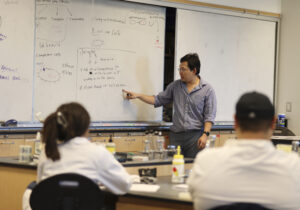
Cabrera, whose goal is to work in politics and law, had an open mind to try out the biotechnology classes with a friend.
“I have the mindset of, ‘I need to experience things before I can make a decision on it,’” Cabrera said. “So as a politician, how are we having people that have never been in a medical lab, have never been in an industrial setting, never been in these different fields, and they’re making major legislation that completely affects what they’re allowed to do, how they’re allowed to do it. So, I want to get as many different experiences as I can, learn as much as I can, and then I just sort of really enjoyed it, so I stayed.”
Biology major Maya Refua, who is currently taking Biotech 3 and will be a teaching assistant in the next semester, plans to transfer to a UC but finds the future bachelor’s program at Pierce interesting.
“I’d be really open to checking out more of the biomanufacturing side of it, especially if it’s going to be offered as a bachelor’s degree at a community college,” Refua said. “I think it’s super exciting, and it’s something I’m open to, even if it wasn’t something I initially considered.”
Teaching assistant Andrew Nguyen, who is getting an associate of science for transfer in biology and an associates in biotechnology, thought about staying at Pierce rather than transferring but decided to pursue studies in the areas of research and development.
“It wasn’t until I found the biotech program through that workshop that I was in, I just decided, “You know, I have nothing else to do this summer, why not, I’ll just go and try something out.’” Nguyen said. “And I decided I really liked it. And after I participated in the program, I realized that I found a direction that I really enjoyed. I realized that I wouldn’t have been in this position without passionate faculty and students going to help out other students.”
The 2nd Annual Biotechnology Student Symposium will be held on June 1 from 9 a.m. to noon in Building 600.

